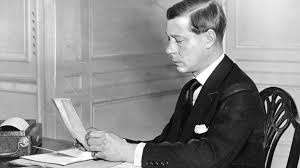Choices and Consequences
By Mallory Slocum
January 18, 2016King Edward VIII is one of the more notable monarchs of the 21st century. He had the shortest reign of any of the British monarchs since 1707 and he was the only one to abdicate in that timespan. His reign lasted less than a year. He ascended the throne in 1936 when his father died.
Edward, also known as David (called that by those who were close to him) was known for not making great choices. During his reign, he showed little concern for what was going on in the kingdom and showed disregard for established constitutional policies. He caused a major uproar when he decided he wanted to marry Wallis Simpson, an American woman who already had been divorced once and was seeking a divorce from her second husband.
This caused an uproar for not only the Prime Minister, Stanley Baldwin, but for Parliament as well. They would not accept Mrs. Simpson as their Queen Consort because she would have two husbands who were still living. The Church of England permits divorce but he/she would not be permitted to remarry while their spouse was still alive. Prime Minister Baldwin intended to resign if the King would have gone through with the marriage, and making her queen.
He abdicated in December and married Wallis the next year. He chose to marry the woman he loved, abandoning his duty to his people. Some say this was for the best and a better king would lead the people in the right direction.
Wallis was not the first married woman that David had a relationship with. It seems that he had a preference for them. We all know of the commandment: Thou shall not commit adultery. Some people are under the misconception that this only applies to those who are married. They are wrong because this also applies to the other person as well.
There was another David who committed this sin of adultery. King David had an affair with Bathsheba, wife of Uriah, and she became pregnant. David had to cover up his “crime” so he had to come up with a plan. Uriah was away, fighting in a war, and David sent for him. He tried to get Uriah to go home, but it seemed he would not comply with this command. David had to come up with another plan. He ordered that Uriah was to be placed on the frontlines. He wanted to make sure Uriah did not come back. He got his wish for Uriah was killed on the battlefield. Once Bathsheba have gone through her period of mourning, David married her and she gave birth to a son. It seemed that although he was trying to right his wrong, “But in the sight of the Lord what David had done was evil.” (2nd Samuel 11:27, NAB)
This particular story is telling the reader the importance of moral values. Proverbs tells us “those who conceal their sins do not prosper, but those who confess and forsake them obtain mercy.” (Proverbs 28:13, NAB) It is important for us to confess our sins. We can’t conceal them. We can’t have our cake and eat it too. King Edward tried to do that and it lead to him to his abdication and living in a life in exile. After his abdication, he and Wallis moved to France. Edward’s relationship with his family became severely strained.
So, we have to ask ourselves: Is there a sin that is worth facing the consequences for? Every choice we make will either have good or bad consequences, and we have to accept whatever the outcome may be. We all have to make choices. Hopefully, we will make the right ones.


